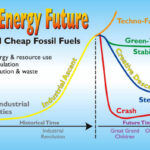Possible Scenarios for the Future: Tim Jackson
Tim Jackson’s Prosperity Without Growth is a book that interested Hopkins. In critiquing all these resources, I was looking for writers who acknowledged the full reality that developed countries will have to do some significant adjusting downward — both in expected volume of economic transactions and in material lifestyles — before we can stabilize to a level where the “without growth” part can realistically take place. While Jackson doesn’t completely dodge it, he puts it so politely and politically that it might easily be missed.
His chapter “The Myth of Decoupling” is key to his discussion of this necessary downward adjustment. Decoupling means disconnecting. Jackson says “Relative decoupling is about doing more with less: more economic activity with less environmental damage.” Absolute decoupling is “the situation in which resource impacts decline in absolute terms.”
If you can slog through the heavy economists’ lingo, you’ll eventually learn that Jackson agrees our society hasn’t yet tried very hard to achieve decoupling. He does understand that absolute decoupling is indeed essential — decreasing our resource impacts overall. But despite Jackson’s (buried) admission that “Business as usual is grossly inadequate,” it seemed like Jackson still harbored a hope that somehow a redefined version of “growth” might still be possible.
In other chapters, Jackson strongly endorses the idea of government stimulus. He goes to great lengths to explain what “green stimulus” might look like and how it could be designed. He endorses investing in jobs, assets and infrastructure – and doesn’t seem to notice that even if these are “green,” the best they could achieve would be relative decoupling rather than absolute.
Jackson’s suggestions presume that a drawn-out, leisurely timeline is available, and they completely overlook the warning rumbling and crumbling that is becoming increasingly evident within our economic systems. These big-picture suggestions offer us little in the way of suggestions for what to do at the local level to develop resilience to major systemic shocks.
Jackson’s October 2010 TED talk is fascinating in that he honors the inner journey — both the journey which got our developed societies so very far off track, and the values we can celebrate as we create the new structures which we will have to create.
He explains that humans have deep evolutionary tensions between what he terms “self-regarding behaviors” and “other-regarding behaviors,” and in this he is aligned with Jeremy Rifkin (“The Empathic Civilization” YouTube). Jackson explains that we have another set of tensions between our drive for novelty (new stuff, new ideas, new adventures, new experiences, our adaptive aspect) and tradition (the things essential for the stability to raise families and form cohesive social groups). He points out that our current economy encourages only one narrow quadrant of the human soul. And he concludes that radical change in the economy isn’t about changing human nature but rather about recognizing the depth and breadth of the human psyche.
In Jackson’s October 2010 Totnes talk, a much more informal forum, Jackson’s understanding of powerdown and economic contraction are at last revealed. The most powerful moment of all my Jackson reading or viewing came when he gently reminded host Naresh Giangrande that rather than merely creating the more-resilient economy of the future, the task we currently face is that we must build resilience through collapse.


